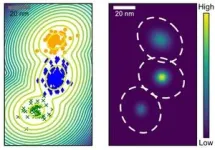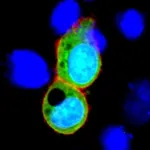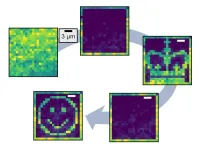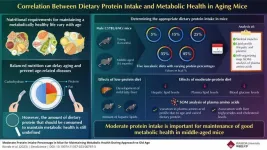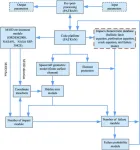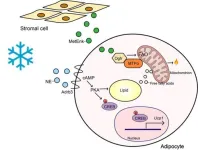(Press-News.org) Chess grandmasters are often held up as the epitome of thinking far ahead. But can others, with a modest amount of practice, learn to think further ahead?
In addressing this question, a team of cognitive scientists has created a computational model that reveals our ability to plan for future events. The work enhances our understanding of the factors that affect decision-making and shows how we can boost our planning skills through practice.
The research, conducted by scientists in New York University’s Center for Neural Science and reported in the journal Nature, centers on the role of “planning depth”—the number of steps that an individual thinks ahead—in decision-making.
“While artificial intelligence has made impressive progress in solving complex planning problems, much less is understood about the nature and depth of planning in people,” explains Wei Ji Ma, a professor of neuroscience and psychology at NYU and the paper’s senior author. “Our work adds to this body of knowledge by showing that even a relatively modest amount of practice can improve depth of planning.”
It’s been long established that a hallmark of human intelligence is the ability to plan multiple steps into the future. However, it’s less clear whether or not skilled decision makers plan more steps ahead than do novices. This is because methods for measuring this aptitude (e.g., experiments involving board games) have notable shortcomings—in part, because they don’t reliably estimate planning depth.
The Nature paper’s authors had people play a relatively simple game—a more sophisticated version of tic-tac-toe—that still required players to plan deeply (i.e., multiple steps ahead). Then, to understand precisely what goes on in people’s minds as they are thinking of their next move in this game, the authors designed a computer model based on AI principles. The model allows them to describe and subsequently predict the moves that people make when faced with new situations in the game.
“In this computational model, players build a ‘decision tree’ in their heads the same way that you might plan for multiple possible scenarios for a complex travel itinerary,” Ma explains.
Here, their calculations showed that human behavior can be captured using a computational cognitive model based on a heuristic search algorithm—one that maps out a sequence of promising moves for both players.
To validate the model, the researchers conducted a series of behavioral experiments with human participants. Specifically, they tracked how players planned their moves under different scenarios while also testing their memory and their ability to learn from and reconstruct their game-playing experiences. In addition, the team conducted a Turing test experiment in which observers, who had played the game before, were asked to determine whether sequences of moves they witnessed were generated by the model or by human players. These observers were able to make the correct distinction only about half the time, suggesting that the model makes similar decisions that a human would make. Several of these experiments may be played online by going to Ma’s laboratory website.
Overall, their results showed that better planning is driven by the ability to recognize patterns more accurately and in less time—outcomes that point to the benefits of practice and experience.
“It is known that cognitive abilities can improve in adulthood through practice,” observes Ma. “These findings show that even a relatively modest amount of practice can improve one’s depth of planning. This opens up new avenues of research. For example, we can use these methods to study the development of planning abilities in children, or test whether planning abilities can be retained in old age. Of course, it is also crucial that we connect planning in the laboratory to planning in real life.”
The paper’s other authors are: Bas van Opheusden, an NYU doctoral student at the time of the study and now a research scientist at Generally Intelligent; Ionatan Kuperwajs, an NYU doctoral student; Gianni Galbiati, an NYU researcher at the time of the study and now director of research and development at Vidrovr; Zahy Bnaya, a postdoctoral researcher at NYU’s Center for Neural Science; and Yunqi Li, an NYU researcher at the time of the study and now a doctoral student at Stanford University.
The research was supported by grants from the National Science Foundation (IIS-1344256, DGE1839302).
# # #
END
Can we learn to think further ahead?
Cognitive scientists’ computational model shows how expertise improves planning depth
2023-05-31
ELSE PRESS RELEASES FROM THIS DATE:
Further link identified between autoimmunity and schizophrenia
2023-05-31
Researchers from Tokyo Medical and Dental University (TMDU) identify a protein in some people with schizophrenia that causes schizophrenia-like features in mice
Tokyo, Japan – Links have been reported between schizophrenia and proteins produced by the immune system that can act against one’s own body, known as autoantibodies. In a study published last month in Brain Behavior and Immunity, Japanese researchers identified autoantibodies that target a ‘synaptic adhesion protein’, neurexin 1α, in a subset of patients with schizophrenia. When injected into mice, the ...
New study unveils nanocrystal shines on and off indefinitely
2023-05-31
A research team affiliated with UNIST has made a significant breakthrough in uncovering the potential of ultra-photostable avalanching nanoparticles (ANP). Their study demonstrates that such particles can perform unlimited photoswitching, leading to new advancements in fields like optical probes, 3D optical memory, and super-resolution microscopy.
This breakthrough has been achieved through the efforts of Professor Yung Doug Suh and his research team in the Department of Chemistry at Ulsan National Institute of Science and Technology (UNIST), in collaboration with researchers from Columbia University and ...
A nanocrystal shines on and off indefinitely
2023-05-31
New York, NY—May 31, 2023—In 2021, lanthanide-doped nanoparticles made waves—or rather, an avalanche—when Changwan Lee, then a PhD student in Jim Schuck’s lab at Columbia Engineering, set off an extreme light-producing chain reaction from ultrasmall crystals developed at the Molecular Foundry at Berkeley Lab. Those same crystals are back again with a blink that can now be deliberately and indefinitely controlled.
“We’ve found the first fully photostable, fully photoswitchable nanoparticle—a holy grail of nanoprobe design,” said Schuck, associate ...
Eat right, live longer: could a moderate protein diet be the coveted elixir of youth?
2023-05-31
As the proverb “You are what you eat” goes, the type of food we consume influences our health and longevity all through our lives. In fact, there is a direct association between age-related nutritional requirements and metabolic health. Optimal nutrition according to age can help maintain metabolic health, thereby improving the health span (period of life without diseases) and lifespan of an individual. Different nutritional interventions involving varied calorie and protein intake have been known to improve the health and lifespan of rodents and primates. Furthermore, recent studies have also reported the association of dietary macronutrients (proteins, ...
How Canadians' lifestyle behaviours changed during the COVID-19 pandemic
2023-05-31
Sixty per cent of roughly 1,600 Canadians who took part in a new McGill University study say their lifestyle habits either stayed the same or improved during the COVID-19 pandemic. On the flip side, 40% of participants say they adopted less healthy lifestyle habits, including worsened eating habits, sleep quality, decreased physical activity and weight gain. The research is based on the Canadian COVIDiet study of Canadians between the ages of 18 to 89 years old. Researchers from McGill’s School of Human Nutrition collected data from across the country during the first wave of infections. ...
Researchers improved the catastrophic failure assessment of sealed cabin for ultra large manned spacecraft in M/OD environment
2023-05-31
Hypervelocity impacts of Micrometeoroid and Orbital Debris (M/OD) seriously threaten the safety of manned spacecraft and astronauts in orbit. At present, M/OD above 10 cm, which can be monitored and predicted in advance, can usually be avoided by orbital maneuver. As for the small-size M/OD, because of the difficulty of monitoring, it is the main impact threat, as well as the main object of impact risk assessment and protection design of manned spacecraft. The probability of no penetration (PNP) of the sealed cabin under M/OD impact is usually used as ...
SwRI’s Thomas Briggs receives SAE International’s Forest R. McFarland Award
2023-05-31
SAN ANTONIO — May 31, 2023 —Dr. Thomas E. Briggs, an Institute engineer in Southwest Research Institute’s Powertrain Engineering Division, has received the Forest R. McFarland Award by SAE International, an organization that works to advance mobility, knowledge and solutions for humanity’s benefit.
Established in 1979, the award serves to honor the late Forest R. McFarland, a long-time SAE International member, for his many contributions to the organization. The award recognizes outstanding contributions by volunteers who further the goals of SAE ...
A new player unveiled for lipid oxidation
2023-05-31
Overweight and obesity pose significant health risks, including an increased likelihood of developing diabetes, cardiovascular disease, and cancer. Researchers are seeking practical ways to promote the oxidation of lipids, which could help balance energy storage and consumption. A recent study has identified opioid growth factor receptor (Ogfr) gene as a promising new target for this process.
Rodents possess thermogenic fat that includes brown and beige adipocytes, which have a high capacity to uptake and utilize glucose ...
More than 80% of people who inject drugs test positive for fentanyl—but only 18% intend to take it
2023-05-31
More than 80% of New Yorkers who inject drugs test positive for the opioid fentanyl, despite only 18% reporting using it intentionally, according to a new study by researchers at the NYU School of Global Public Health.
The findings, published in the International Journal of Drug Policy, suggest that many people who inject drugs are unknowingly using fentanyl, which may increase their risk for overdose and potentially their tolerance to fentanyl if it is used over time.
In 2021, more than 100,000 people died of a drug overdose in the United States, with 66% of these deaths involving illicit fentanyl—a synthetic opioid that is 50 to 100 times more potent than morphine.
In ...
Cats can play a role in transmitting COVID-19
2023-05-31
Washington, DC – Cats can play a role in the transmission of SARS-CoV-2 and their contaminated environment (pens in this study) can be infectious, according to new research. The study was published in Microbiology Spectrum, a journal of the American Society for Microbiology.
“In practice, after introduction of SARS-CoV-2 in our household, we should see our cat as part of the family regarding virus transmission,” said study coauthor Wim van der Poel DVM, Ph.D., Professor of Emerging and Zoonotic Viruses, Wageningen University and Research, in the Netherlands.
Van der Poel and colleagues conducted the study to gain better insight ...
LAST 30 PRESS RELEASES:
Global Physics Photowalk winners announced
Exercise trains a mouse's brain to build endurance
New-onset nonarteritic anterior ischemic optic neuropathy and initiators of semaglutide in US veterans with type 2 diabetes
Availability of higher-level neonatal care in rural and urban US hospitals
Researchers identify brain circuit and cells that link prior experiences to appetite
Frog love songs and the sounds of climate change
Hunter-gatherers northwestern Europe adopted farming from migrant women, study reveals
Light-based sensor detects early molecular signs of cancer in the blood
3D MIR technique guides precision treatment of kids’ heart conditions
Which childhood abuse survivors are at elevated risk of depression? New study provides important clues
Plants retain a ‘genetic memory’ of past population crashes, study shows
CPR skills prepare communities to save lives when seconds matter
FAU study finds teen ‘sexting’ surge, warns of sextortion and privacy risks
Chinese Guidelines for Clinical Diagnosis, Treatment, and Management of Cirrhosis (2025)
Insilico Medicine featured in Harvard Business School case on Rentosertib
Towards unlocking the full potential of sodium- and potassium-ion batteries
UC Irvine-led team creates first cell type-specific gene regulatory maps for Alzheimer’s disease
Unraveling the mystery of why some cancer treatments stop working
From polls to public policy: how artificial intelligence is distorting online research
Climate policy must consider cross-border pollution “exchanges” to address inequality and achieve health benefits, research finds
What drives a mysterious sodium pump?
Study reveals new cellular mechanisms that allow the most common chronic cardiac arrhythmia to persist in the heart
Scientists discover new gatekeeper cell in the brain
High blood pressure: trained laypeople improve healthcare in rural Africa
Pitt research reveals protective key that may curb insulin-resistance and prevent diabetes
Queen Mary research results in changes to NHS guidelines
Sleep‑aligned fasting improves key heart and blood‑sugar markers
Releasing pollack at depth could benefit their long-term survival, study suggests
Addictive digital habits in early adolescence linked to mental health struggles, study finds
As tropical fish move north, UT San Antonio researcher tracks climate threats to Texas waterways
[Press-News.org] Can we learn to think further ahead?Cognitive scientists’ computational model shows how expertise improves planning depth

